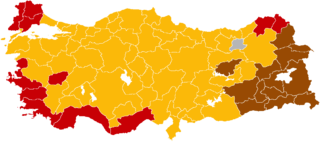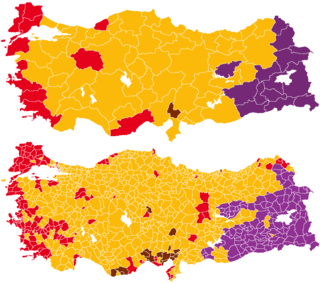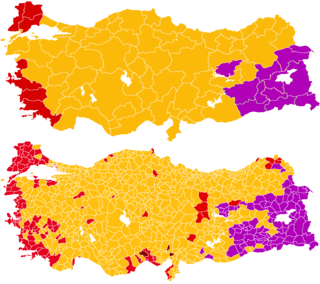Related Research Articles

General elections were held in Turkey on 3 November 2002 following the collapse of the Democratic Left Party–Nationalist Movement Party–Motherland Party coalition led by Bülent Ecevit. All 550 members of the Grand National Assembly were up for election.

Kemal Kılıçdaroğlu is a Turkish economist, retired civil servant and social democratic politician. He is leader of the Republican People's Party (CHP) and has been Leader of the Main Opposition in Turkey since 2010. He served as a Member of Parliament for İstanbul's second electoral district from 2002 to 2015 and as an MP for İzmir's second electoral district as of 7 June 2015.

The Turkish local elections of 2004 were held throughout the eighty-one Provinces of Turkey on 28 March 2004 in order to elect both mayors and councillors to local government positions. All 16 metropolitan and 3,193 district municipalities were up for election, while 3,208 provincial and 34,477 municipal councillors were also elected. More than 50,000 neighbourhood presidents (muhtars) were also elected, though these do not have any political affiliations.

General elections were held in Turkey on 12 June 2011 to elect the 550 members of Grand National Assembly. In accordance to the result of the constitutional referendum held in 2007, the elections were held four years after the previous elections in 2007 instead of five.

General elections were held in Turkey on 7 June 2015 to elect 550 members to the Grand National Assembly. This was the 24th general election in the history of the Turkish Republic, electing the country's 25th Parliament. The result was the first hung parliament since the 1999 general elections. Unsuccessful attempts to form a coalition government resulted in a snap general election being called for November 2015.

Local elections were held in Turkey on 30 March 2014, with some repeated on 1 June 2014. Metropolitan and district mayors as well as their municipal council members in cities, and muhtars and "elderly councils" in rural areas were elected. In light of the controversy around the elections, it was viewed as a referendum on the government of Prime Minister Recep Tayyip Erdoğan. About 50 million people were eligible to vote.

Mansur Yavaş is a Turkish lawyer and politician who is currently the Mayor of Ankara, holding the office since April 2019. He was elected in the 2019 local election as the candidate of the Nation Alliance, an opposition alliance formed by the Republican People's Party (CHP) and the İYİ Party.

Muharrem İnce is a Turkish physics teacher, school principal, sport executive, and politician. He founded and is leader of the Homeland Party since May 2021. Formerly a four term Republican People's Party MP for Yalova, his hometown, he also served as the CHP's parliamentary group deputy chairman between June 2010 and August 2014.

The 2003 by-election in the Province of Siirt was held on 9 March 2003 in order to elect three Members of Parliament from the eastern Turkish province of Siirt to the Grand National Assembly of Turkey. The by-election was held four months after the 2002 general election in November, which the Supreme Electoral Council of Turkey declared null and void in Siirt due to voting irregularities in the district of Pervari. The council decided on 2 December 2002 that the complaints by the local electoral authorities had influenced on the election result, thus calling a by-election.
In the run-up to, during and after the Turkish general election of June 2015, numerous accusations of electoral fraud and violence were made by opposition parties. Electoral fraud in Turkey has usually been most extensive during local elections, where individual votes have significantly larger impact in determining local administrations. Although the 2014 presidential election saw little evidence of electoral misconduct, issues regarding voter records as well as extensive media bias have been controversial issues that have remained largely unaddressed. In both the local and presidential elections in 2014, several voters reported that ballot papers had been sent to addresses that are wrong or do not exist as well as voters that have been dead for a substantial amount of time.
The electoral system of Turkey varies for general, presidential and local elections that take place in Turkey every five years. Turkey has been a multi-party democracy since 1950, with the first democratic election held on 14 May 1950 leading to the end of the single-party rule established in 1923. The current electoral system for electing Members of Parliament to the Grand National Assembly has a 7% election threshold.

General elections were held in Turkey on 1 November 2015 to elect 550 members to the Grand National Assembly. They were the 25th general elections in the History of the Republic of Turkey and elected the country's 26th Parliament. The election resulted in the Justice and Development Party (AKP) regaining a Parliamentary majority following a 'shock' victory, having lost it five months earlier in the June 2015 general elections.
Mayoral elections were held in the Turkish Province of Yalova on 30 March 2014, as part of the nationwide local elections occurring on the same day. A total of 14 municipal mayors were elected in Yalova Province, with one mayor from Central Yalova, five mayors from neighbouring districts and 8 mayors from rural beldes.

Mayoral elections were held in the Turkish province of Ankara as part of nationwide local elections on 30 March 2014. A total of 26 mayors, one for each of the 25 districts of Ankara and one for the Ankara Metropolitan Municipality, were elected.

The Turkish local elections of 2019 were held on Sunday 31 March 2019 throughout the 81 provinces of Turkey. A total of 30 metropolitan and 1,351 district municipal mayors, alongside 1,251 provincial and 20,500 municipal councillors were elected, in addition to numerous local non-partisan positions such as neighbourhood wardens (muhtars) and elderly people's councils.

Presidential elections were held in Turkey on 24 June 2018 as part of the 2018 general election, alongside parliamentary elections on the same day. They were the first direct presidential elections, following constitutional amendments approved in a 2017 referendum, which also resulted in the abolition of the office of Prime Minister. Previously, presidents had been elected by parliament.

Parliamentary elections were held in Turkey on 24 June 2018 as part of general elections, with presidential elections taking place on the same day. Originally scheduled for 3 November 2019, President Recep Tayyip Erdoğan called snap elections on 18 April after months of speculation. With the passage of a series of constitutional amendments in the 2017 referendum, the number of MPs will be increased from the previous 550 to 600. These representatives will be elected by the constituents of the 87 electoral districts of Turkey by party-list proportional representation.
Multiple political parties in Turkey underwent candidate selection processes in the run-up to the 2018 presidential election. Parties represented in the Grand National Assembly were able to field candidates directly by collecting signatures from at least 20 of their Members of Parliament, as were parties who had no representation but won more than 5% in the previous general election. Candidates that did not meet either criterion were required to obtain over 100,000 signatures from Turkish citizens between 4 and 9 May.

The March 2019 Istanbul mayoral election took place on 31 March 2019, as part of the 2019 Turkish local elections. In addition to a mayor for the Istanbul Metropolitan Municipality, all 39 Istanbul districts elected their own individual mayors as well as district councillors.

The June 2019 Istanbul mayoral election was held on 23 June 2019. It was a repeat of the March 2019 mayoral election, which was annulled by the Supreme Electoral Council (YSK) on 6 May 2019. The original election had resulted in a narrow 0.2% margin of victory for opposition candidate Ekrem İmamoğlu, causing the governing Justice and Development Party (AKP) to successfully petition for a by-election.
References
- ↑ "Vefa Salman Haberleri - Yazılar, Videolar ve Galeri - Habertürk".
- ↑ "Yalova'da CHP'li başkanın gözyaşları".
- ↑ "Yalova seçim sonuçları 1 Haziran". 2 June 2014.
- ↑ "Vefa Salman ilk kez konuştu".
- ↑ "Yalova Belediye Başkanı Vefa Salman görevden uzaklaştırıldı". Anadolu Agency . Retrieved 2022-05-21.
- ↑ "Hukuk öğrencisi kazada yaşamını yitirdi".